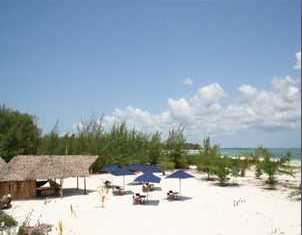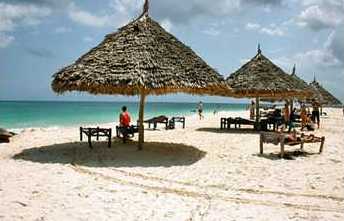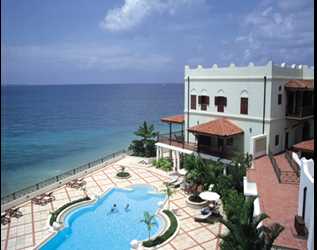Kilimanjaro Packages
Incredible Zanzibar

Blue Bay Beach Resort & Spa
DAY 1: EAST COAST – BLUE BAY BEACH RESORT & SPAFly to Zanzibar. Upon arrival at the Zanzibar airport... Read moreWednesday, 08 December 2010 11:15

Konokono Beach Villas
DAY 1: STONE TOWN – KONO KONO BEACH VILLASFly to Zanzibar. Upon arrival at the Zanzibar airport, you... Read moreWednesday, 08 December 2010 11:26

Ras Nugwi Beach Hotel
DAY 1: NORTH COAST – RAS NUGWI BEACH HOTEL Fly to Zanzibar. Upon arrival at the Zanzibar airport,... Read moreWednesday, 08 December 2010 11:30

Breezes Beach Club & Spa
DAY 1: EAST COAST – BREEZES BEACH CLUB & SPAFly to Zanzibar. Upon arrival at the Zanzibar airport,... Read moreWednesday, 08 December 2010 11:57

Pongwe Beach Hotel
DAY 1: NORTH EAST COAST – PONGWE BEACH HOTEL Fly to Zanzibar. Upon arrival at the Zanzibar airport,... Read moreWednesday, 08 December 2010 12:02

Zanzibar Serena Beach Extension
DAY 1: STONE TOWN – ZANZIBAR SERENAFly to Zanzibar. Upon arrival at the Zanzibar airport, you will... Read moreWednesday, 08 December 2010 12:04
IMPORTANT INFORMATION FOR CLIMBERS
Before and during the climb
We recommend at least one rest day before starting your trek. If you are transferring from Nairobi, this can act as your rest day. If you have time, enjoy a guided walk through the local rice fields and rainforest, do a little shopping in the town of Moshi, relax at the swimming pool, or get a massage.Â
Your guide will provide a briefing the evening before your trek, and you must separate one bag for the trek from your other luggage. Rental equipment is available. Extra luggage can be stored in a locked storage room at your Moshi hotel at no charge.
The next morning, enjoy a hearty breakfast before last-minute trip preparations at the trekking office. Depending on the route you take, the drive to the trailhead can take up to one hour and can be very bumpy.
Once you reach the park gate, climbers are requested to make their final preparations for the climb and sign the national park registration book. Porters will be seen arranging their packs containing the food, water, and other equipment. Make sure that you have all your day pack items with you as the porters travel very quickly. Your guide will be pleased to assist with any additional information.
The average hiking day begins between 8-9am and is about 5 to 6 hours, walking very, very slowly. The distances you will hike each day are very moderate so as to acclimate a little at a time. Your guides will repeat over and over, "pole pole" (po-ly, po-ly), which means "go slowly" in Swahili.
The terrain lower down is absolutely gorgeous and fascinating. Higher up, the views are vast. There is little to do at the camps themselves, so take advantage of the slow pace to absorb the scenery and take every photo opportunity.
The hike to the summit starts around midnight depending on your route and speed of your group. You will go as high as you feel fit. Some people stop at the crater rim, and others continue to the very highest point on the mountain. Your guides will then take you down as quickly as possible to minimize any altitude problems. You will continue past your last campsite to the next one for overnight.
You can add an extra day at the Horombo Huts (3,690 m/12,100 ft). You can spend a full day and a second night at Horombo. On this day, you can rest at the huts or take a stroll up to the Mawenzi basecamp then return to the Horombo Huts. This extra day will help your acclimatization, and further your understanding of the mountain’s weather and altitude. After your pause, you will continue up to the Kibo Huts on your fourth day for your midnight start to the summit.
Food
The staple foods in Tanzania are meats, starches, and fruits. Some western foods are difficult to find locally (herbal tea, soy products, specialty items). You may want to bring some of the items with you as well as comfort foods (like chocolate), and high-energy foods (Power bars, Gatorade, etc.).  Breakfast, lunch, dinner, and afternoon tea are provided on the trek. All meals will have some sort of fruit like bananas, oranges, papayas, and watermelon. Most meals will also have a selection of hot drinks like instant coffee, tea, and hot chocolate.Vegetarian and other special diets can be accommodated. Please let us know ahead of time and remind your guide during your trek briefing. Protein options may be minimal on a vegetarian diet, so you may want to bring protein supplements.
Because of the exercise and high altitude, you is recommended that you drink at least 3 liters of water a day. The porters will purify water for you at each camp. Altitude may diminish your appetitie, but it is very important to keep eating.
At your Moshi , only breakfasts are included. Lunches and dinners are available at an extra charge.
Money
The local currency is Tanzanian shillings. U.S. dollars, Euros, and credit cards may be accepted by larger stores and hotels, but the exchange rate is better with shillings. ATM's are only available in larger towns like Moshi and Arusha. Most people bring the bulk of their money in travellers cheques, but will also bring some cash including smaller bills. For travellers cheques, there is often a $1/cheque fee, and the exchange rate is better for $100 cheques.Guides
A local guide is required to hike Kilimanjaro. We have guides that speak English, Spanish, French and German. Porters will also go on the trip to carry your luggage, food, and other equipment. You will only have to carry a day pack with your daily essentials.Tips for the guides and porters on Kilimanjaro
- Â Â You will want to hand out tips at camp the morning of the last day of the trek. You can use U.S. dollars, Euros, TZ shillings, or a combination of these. It helps if you have small bills to tip everyone individually.
- Â Â The typical tip is $15/day for guides, $10/day for assistant guides and cooks, $7/porter/day for porters. This is from the whole group, not per hiker.
- Â Â Expect 1 guide per 8 hikers, 1 assistant guide per 3 hikers, and 1 cook per 8 hikers. Porters as follows:
- Â Â 2 porters per hiker on the 5-day Marangu Route (minimum of 4 porters)
- Â Â 3 porters per hiker on a 6 or 7-day trek (minimum of 5 porters)
- Â Â 4 porters per hiker on the 8-day Lemosho Route (minimum of 8 porters)
- Â Sometimes extra porters are required based on the weight of the luggage.
- Â Â Budget $200 per hiker for tips for a 6-day trek.
- Â Â Gifts: Guides and porters also appreciate your warm clothing, shoes, and packs. You may want to bring some older clothing items just for this purpose.
- Â Â Celebration: You are also welcome to invite your guides back to the Springlands Hotel for drinks and/or dinner (on you) as a thank-you in addition to their tip.

